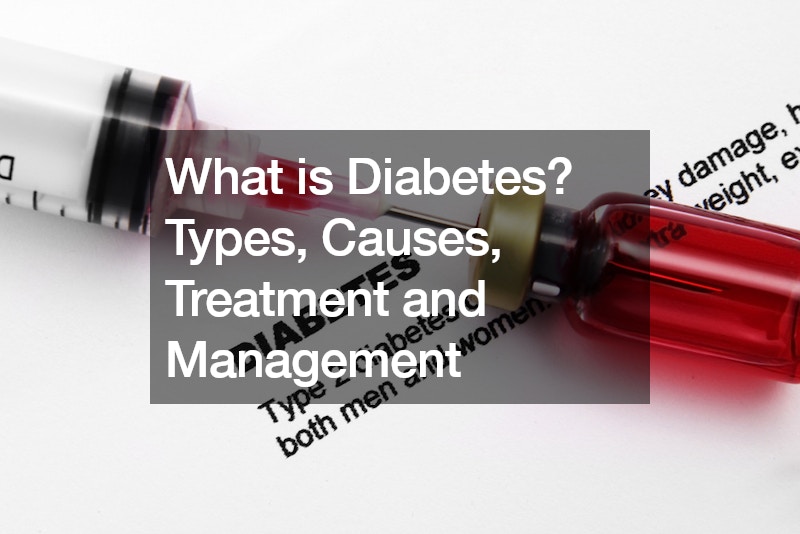Disclaimer: This website provides health information for educational purposes only and is not a substitute for professional medical advice, diagnosis, or treatment. Always seek the guidance of a qualified healthcare provider with any questions you may have.
Diabetes is a complex metabolic disorder characterized by elevated blood glucose levels, resulting from either insufficient insulin production or ineffective utilization of insulin by the body. This article aims to provide a comprehensive overview of diabetes, including its types, causes, treatment options, and management strategies.
Understanding Diabetes:
Diabetes manifests in various forms, with the two primary types being Type 1 and Type 2 diabetes. Type 1 diabetes is an autoimmune condition where the body’s immune system attacks and destroys insulin-producing beta cells in the pancreas, leading to an absence of insulin production. Conversely, Type 2 diabetes occurs when the body becomes resistant to insulin or fails to produce enough insulin to meet its needs.
Causes of Diabetes:
Type 1 diabetes is believed to have a genetic predisposition, although environmental factors, such as viral infections, may trigger its onset. Type 2 diabetes is strongly linked to lifestyle factors, including poor diet, sedentary lifestyle, obesity, and genetic predisposition. Gestational diabetes can also develop during pregnancy due to hormonal changes that affect insulin sensitivity.
Symptoms and Complications:
Common symptoms of diabetes include excessive thirst, frequent urination, unexplained weight loss, fatigue, blurred vision, and slow wound healing. If left untreated, diabetes can lead to serious complications, including cardiovascular disease, kidney failure, nerve damage (neuropathy), eye problems (retinopathy), and foot complications.
Diagnosis and Monitoring:
Diabetes is diagnosed through blood tests that measure fasting blood glucose levels, oral glucose tolerance tests, or glycated hemoglobin (HbA1c) levels. Monitoring blood glucose levels regularly is essential for managing diabetes effectively. Glucose monitoring devices, including glucometers and continuous glucose monitors (CGMs), help individuals track their blood sugar levels. Additionally, technological advancements have led to the development of glucose monitoring apps that enable users to log and analyze their glucose readings conveniently.
Treatment Options:
Treatment for diabetes aims to control blood glucose levels and prevent complications. Type 1 diabetes is managed with insulin therapy, which may involve multiple daily injections or insulin pump therapy. Type 2 diabetes treatment typically involves lifestyle modifications, such as dietary changes, regular exercise, weight management, and oral medications to lower blood sugar levels. In some cases, insulin therapy may be necessary to achieve optimal glucose control.
Diabetes Management Strategies:
Effective diabetes management requires a multidisciplinary approach, involving healthcare professionals, nutritionists, educators, and support networks. Patients are encouraged to adopt healthy lifestyle habits, monitor their blood glucose levels regularly, adhere to prescribed medications, and attend regular medical check-ups. Education about carbohydrate counting, meal planning, physical activity, and stress management is also crucial for diabetes self-management.
Prevention and Risk Reduction Strategies for Diabetes
Diabetes is a chronic condition that affects millions of people worldwide, but the good news is that many cases of diabetes can be prevented or delayed through lifestyle modifications and proactive health management strategies. By adopting healthy habits and making informed choices, individuals can significantly reduce their risk of developing diabetes or manage the condition effectively if they are at risk.
One of the most effective prevention strategies for diabetes is maintaining a healthy weight. Being overweight or obese significantly increases the risk of developing Type 2 diabetes, as excess body fat can lead to insulin resistance and impaired glucose metabolism. By achieving and maintaining a healthy weight through a balanced diet and regular physical activity, individuals can lower their risk of diabetes and improve overall health.
A key component of diabetes prevention is adopting a balanced and nutritious diet. Consuming a diet rich in whole grains, fruits, vegetables, lean proteins, and healthy fats can help regulate blood sugar levels, promote weight loss or maintenance, and reduce the risk of diabetes. Limiting the intake of sugary beverages, processed foods, and high-calorie snacks is essential for managing blood sugar levels and preventing insulin resistance.
Regular physical activity is another crucial aspect of diabetes prevention and management. Engaging in regular exercise helps control weight, improve insulin sensitivity, and lower blood sugar levels. Aim for at least 150 minutes of moderate-intensity aerobic activity, such as brisk walking, cycling, or swimming, per week, along with muscle-strengthening activities on two or more days per week.
Managing stress and prioritizing mental well-being are also important for diabetes prevention. Chronic stress can contribute to unhealthy behaviors such as overeating or poor dietary choices, which can increase the risk of diabetes. Practice stress-reducing techniques such as meditation, deep breathing exercises, yoga, or spending time in nature to promote relaxation and emotional balance.
Regular health screenings and check-ups are essential for early detection and management of diabetes risk factors. Monitoring blood pressure, cholesterol levels, and blood sugar levels can help identify any abnormalities and allow for timely intervention. Additionally, individuals with a family history of diabetes or other risk factors should discuss their concerns with a healthcare professional and develop a personalized prevention plan.
Conclusion:
Diabetes is a chronic condition that requires lifelong management to prevent complications and maintain overall health and well-being. By understanding the types, causes, symptoms, and treatment options for diabetes, individuals can take proactive steps to manage their condition effectively. With the support of healthcare professionals and technological tools like glucose monitoring apps, people living with diabetes can lead fulfilling lives while keeping their blood sugar levels under control.
.





